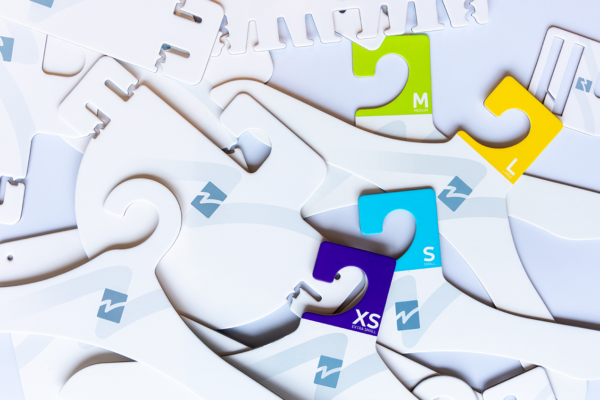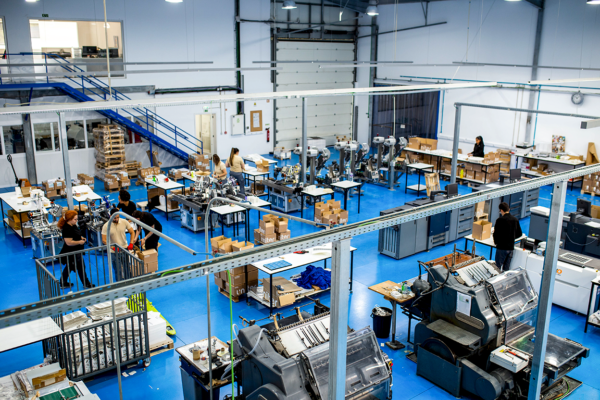Your suppliers and business partners say a lot about you. Your business could invest serious time, effort, and money into environmental, social, and governance (ESG) initiatives, only to unearth less than stellar practices in an outsourcing partner.
Here at Checkpoint, industry-recognized certifications are built into our business, so clients like you automatically benefit from them as part of your value chain. Most of them are standard in the fashion industry, so we’ve chosen to go one step further by becoming members of Textiles 2030, the Sustainable Apparel Coalition, the Global Fashion Agenda, and other change-making organizations.
Read: our 3 new fashion sustainability group memberships
Here’s a quick rundown of Checkpoint’s certifications and accreditations from an environmental, social, and governance (ESG) standpoint, what they mean, and how they benefit you.
Environment
Forest Stewardship Council® (FSC®)
An FSC certification is a commitment to responsible forestry. Because paper and cardboard are so widely used in fashion and apparel labeling and packaging, it’s crucial to source those materials with responsibility, sustainability and full traceability in mind.
Checkpoint has held material certifications for FSC in 12 of our global locations for decades. This means that the materials we use for your labels have been harvested responsibly, with thought and care given to safeguarding endangered forests and biodiversity, plus fair treatment for workers and local communities. If you’re a brand that has worked hard to become FSC certified, it makes sense to team up with a labeling partner who is, too.

Global Recycled Standard (GRS)
Provenance is important when you’re dealing with recycled goods. Checkpoint’s Global Recycled Standard (GRS) certification guarantees that the materials we present you with are exactly what we say they are. GRS is a globally recognized certification for products with a minimum threshold of verified recycled content. It establishes supply chain transparency and encourages manufacturers to innovate where reclaimed materials are concerned.
A GRS certification also guarantees that your recycled yarn was made with a verifiable chain of custody in accordance with their social compliance by well-looked-after workers. Because of this, we ensure our woven label factories are GRS-certified by accredited independent auditors every year.
ISO accreditations and standards
For the most part, ISO accreditations are an industry-wide standard. However, that doesn’t mean they aren’t important. Checkpoint holds ISO 14001 to guarantee that our environmental impact is being measured and improved. We also hold ISO 9001 for quality management and ISO 45001 for occupational health and safety. Accreditations and standards like these lay the foundation for great business practices and ensure we’re accountable for keeping on top of them.
OEKO-TEX®
OEKO-TEX® is a collective of independent textile and leather testing institutes based in Europe and Japan. They collaborate on accredited testing methods to determine their safety standards. Their tests and audits help manufacturers worldwide develop safe, quality textile and leather products.
Our OEKO-TEX® certification guarantees that none of your textiles contain harmful chemicals or substances. This is another industry-standard certification, but it's an incredibly important one, not just for the health and safety of your customers but also for keeping the environment clear of harmful substances.
Higg FEM
The Higg Index (now Worldly) is considered one of the most comprehensive frameworks for measuring sustainability performance in the apparel industry. Because we see compliance as a continual improvement and review process, our sites have been actively engaging with HIGG tools, including FEM since 2017.
The Higg Facility Environmental Module assesses the environmental impact of product manufacturing at our facilities. That includes things like energy use, water usage, air emissions, and waste management. Checkpoint's performance is scored against the Higg standard and aligned with industry benchmarks, so it's easy to see how we need to improve.
Social
Higg FSLM
All our major manufacturing sites are certified under the Higg Facility Social & Labor Module (FSLM). As the name suggests, this Higg module measures the overall social labor practices in facilities. It looks at wages, health and safety, hiring and termination practices, working hours, and the treatment of employees.
As a global labeling partner, it’s important to ensure we look after our people according to a recognized framework. This means you can rest assured that the local teams involved with your project are well looked after.

Governance
Sedex Members Ethical Trade Audit
It goes without saying that all our production sites carry Sedex and SMETA audits as a baseline for how we work. Sedex is one of the world’s leading ethical trade service providers. It aims to improve working conditions in global supply chains and help retailers and suppliers manage their social and environmental performance.
The Sedex Members Ethical Trade Audit (SMETA) focuses on occupational safety, labor conditions, ethical business practices, and environmental standards. It’s a globally recognized way to assess supply chain activities to make sure everything is safe, fair, and ethical. In addition, many of our facilities also carry brand-specific audits, such as Disney’s FAMA certification and Walmart’s SA8000® certification.
By choosing a labeling partner like Checkpoint, you’re effectively strengthening your own sustainability credentials. Think about it like this — our certifications reinforce the hard work you’ve already done to build a responsible business.
Do you have any questions about our certifications? Contact me or the team and ask away — we’re an open book and always happy to share what we know. You can also visit our sustainability page for more information on our certifications, memberships, and accreditations.
